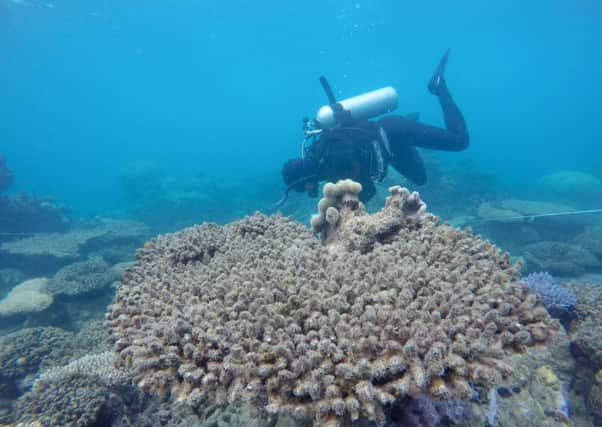Lancaster University team in bid to save coral reefs


The world’s reefs are under siege from global warming, according to a novel study published in the prestigious journal, Science.
For the first time, an international team of researchers – including Lancaster University – has measured the escalating rate of coral bleaching at locations throughout the tropics over the past four decades.
Advertisement
Hide AdAdvertisement
Hide AdThe study documents a dramatic shortening of the gap between pairs of bleaching events, threatening the future existence of these iconic ecosystems and the livelihoods of many millions of people.
“Coral bleaching is a stress response caused by exposure of coral reefs to elevated ocean temperatures,” said co-author of the study, Professor Nick Graham of Lancaster University.
“When bleaching is severe and prolonged, many of the corals die.
“It takes at least a decade to replace even the fastest-growing species.
Advertisement
Hide AdAdvertisement
Hide Ad“Reefs have entered a distinctive human-dominated era – the Anthropocene.
“The climate has warmed rapidly in the past 50 years, first making El Niños dangerous for corals, and now we’re seeing the emergence of bleaching in every hot summer.”
The researchers show that tropical sea temperatures are warmer today during cooler than average La Niña conditions than they were 40 years ago during El Niño periods.
“The time between bleaching events at each location has diminished five-fold in the past three to four decades, from once every 25-30-years in the early 1980s to an average of just once every six years since 2010,” says lead author Professor Terry Hughes, Director of the ARC Centre of Excellence for Coral Reef Studies (Coral CoE).
Advertisement
Hide AdAdvertisement
Hide AdFor example, the Great Barrier Reef has now bleached four times since 1998, including for the first time during back-to-back events in 2016 and 2017, causing unprecedented damage.
“We hope our stark results will help spur on the stronger action needed to reduce greenhouse gases in Australia, the United States of America and elsewhere,” said Professor Hughes.